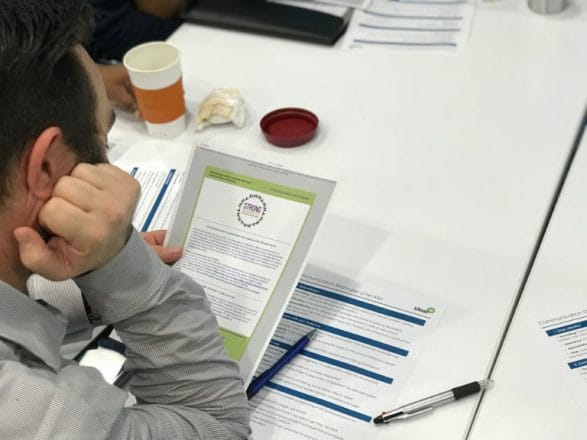We’ve spent more than a decade applying behavioral science to complex social problems, all in the service of improving the lives of millions of people. Part of our mission is to dramatically expand the use of behavioral science as a problem-solving tool, and that’s why we’ve recently broadened our efforts to bring this approach to more problem solvers.Earlier this year, we launched the NYC Behavioral Design Center (BDC) to bring behavioral solutions to the myriad NYC non-profit organizations working to advance the well-being of countless residents in the nation’s largest city. Applying a behavioral lens to many of the common problems these organizations face—such as low enrollment in programs or drop-off in client participation—can help more New Yorkers access and benefit from valuable programs and services.
The BDC is our first centralized capacity-building resource for leaders and staff of local non-profit agencies. So what specifically does the NYC Behavioral Design Center do, and how can service providers and civic activists leverage it?
First, we hold free workshops approximately once a month. Topics range from unpacking how living in poverty affects decision-making to applying a behavioral lens to program communications. Participants in our 2018 workshops are now leveraging behavioral insights to improve email and print communications, rethink how information is portrayed on their website, and streamline the processes for enrolling in programs. These strategies can improve persistence as well as engagement, which in turn makes it more likely that more people will benefit from these programs and make progress toward their goals.
BDC workshops have a strong focus on applying behavioral science insights and research findings to the practical challenges participants encounter in their day-to-day work. For example, this fall, we held a session on Behavioral Design and Civic Engagement for members of United Neighborhood Houses (UNH), the membership organization of 40 New York City settlement houses and community centers that provide vital services to more than 750,000 New Yorkers each year. Several participating organizations then applied what they learned to their Get Out the Vote communications before the midterm elections in November. One UNH member organization, the Educational Alliance, used tips on leveraging social norms to create a Why We Vote campaign, wherein they made and shared a montage of photos of staff and community members with signs stating why they voted. Recognizing that civic engagement is an everyday and every year endeavor, and not just about Election Day, UNH and its members plan to continue applying behavioral science strategies as they encourage people to participate in civic life and advocacy, Participatory Budgeting, the 2020 Census and more.
The BDC also works directly with organizations to design solutions to problems they encounter in their ongoing programs. We recently selected the first group of five non-profit partners with whom we will work to identify behavioral barriers within their programs and design solutions that facilitate productive use of services, by increasing participant engagement, persistence, and follow-through.
For example, in our first cohort, we’re working with Room to Grow to develop effective referral strategies for the new Bronx location of their program that provides low-income families of infants with coaching, service referrals, and essential baby goods from prenatal stage through age three.
Additionally, we’re partnering with Queens Community House to develop behaviorally informed strategies for encouraging older high school students at risk of not graduating to obtain services and support aimed at increasing school attendance and facilitating a smooth transition to post-secondary education and employment.
Finally, the BDC offers free weekly office hours to NYC non-profits interested in one-on-one, applied behavioral science consulting and advice. This is a great option for people with quick questions, such as seeking advice on a communication piece or input on whether a behavioral intervention is appropriate for a particular problem.
By offering support through multiple channels including in-depth workshops, customized project assistance, and quick-touch office hour consultations, we aim to reduce the barriers (and hassles) to tapping the power of behavioral science to improve individual lives and strengthen communities. Stay tuned to hear about upcoming workshops and results from our first project partnerships.
Are you a New York area non-profit interested in utilizing the Behavioral Design Center? Sign up for our listserv or an office hour, or email us at laura@ideas42.org to learn more.



